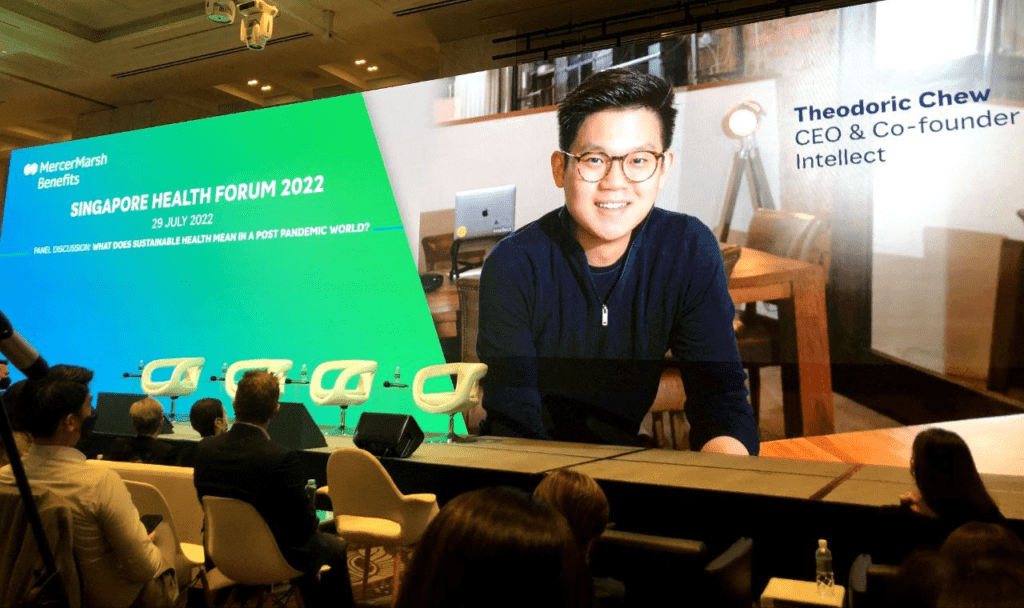Once, sustainability was chiefly thought of through the lens of energy. Then COVID-19 struck and quickly became a “before and after” event for organisations. In face of economic turmoil, workplace transitions, and employee exodus, the global workforce is confronted with a different energy crisis altogether – a mental health pandemic. Overnight, sustainability entailed so much more.

It is in this climate that Mercer brought over 150 HR leaders in one room. At Mercer’s Singapore Health Forum, workplace sustainability was examined through environmental, social, and governance terms—as outlined by the Senior Minister of State for Manpower Mr Zaqy Mohamad in his keynote speech.
We barely caught a break in the last two years—on that much we can agree. As Mercer’s Partner and Health Lead Neil Narale highlighted, the world at large is fraught with unpredictable risks far beyond our control. Who would’ve thought that the pandemic was just the first tile of a domino train? Supply chain disruptions, climate change, and the repercussions of an ongoing war later formed the backdrop against which we reevaluate our personal and professional lives.

Are we content? Or are we worn out? How do we show up amid uncertainty and transitions? The Centre for Bhutan and Gross National Happiness Studies, a social science research institute in one of the happiest countries in the world, attempts to answer. At the forum, former Prime Minister Dasho Tsering Tobgay shed light on extending the GNH metric to businesses and putting workplace factors—from community to psychological safety—under the microscope.

Closer to home, progress in Singapore looks like the inception of an Interagency Taskforce on Mental Health. Mr Zaqy Mohammad introduces the iWorkHealth tool which sets out to uncover underlying reasons for workplace challenges and develop targeted solutions. Likewise, companies are also taking matters into their own hands. Alexio, for instance, has walked the talk by providing employees with counselling and enabling in-house wellbeing champions.

Which begs the question: Is creating a sustainable workplace the responsibility of our government, organisations, or individuals? CEO of Intellect Theodoric Chew stresses the importance of a multi-stakeholder effort in the future of mental healthcare and envisions a pivot away from treatment to prevention; from a reactive to a proactive approach. Our youths may be the loudest, but their sentiments are echoed across the workforce. Employee expectations have evolved, and companies would be remiss to dismiss them.

How can companies do better? Awareness counts for little when not put into tangible and effective action. The last two years have exposed the inadequacies of existing mental healthcare provisions, whether it be the lack of accessibility, personalisation, or cultural attunement. Now more than ever, companies are recognising just how intertwined our personal and professional lives are. Only through equipping employees with toolkits to improve both—at their own time and on their own terms—can they bring their best selves to work.

A long overdue conversation has just begun, and it certainly does not stop at a self-care webinar. It is clear that HR professionals at the forum concur, and here’s addressing three upvoted and unanswered questions on how companies can do better.

Q: Many provide webinars and talks to address mental health. But are these really effective?
A: These are a great primer to start the discourse on mental health, but companies still experience problems such as poor utilisation and employee case escalations. From Intellect’s understanding of our clients’ pain points, these isolated webinars do not appear to have a sustained impact on employee wellbeing.
Co-speaker Alvin Fu put it best in his analogy: attending a webinar on push-ups will not make a difference to one’s physical health, but going to the gym for months will. Maintaining one’s mental health is no different. Here at Intellect, we have found that webinars are most effective as launch sessions but access to practitioners such as behavioural coaches and psychology experts has increased utilisation significantly.
Q: For companies starting on workplace wellbeing—any tips?
A: Start with your employees: What do they want? Clients that have enjoyed success with Intellect often have an employee voice. Foodpanda, for instance, saw 98% of their employees voting for Intellect as an employee benefit they wish to have.
The next question is: through what medium do they prefer to access wellbeing support? Chances are, employees want to seek it out at their own pace, on their own terms, and with the assurance of confidentiality. These are key components to a mental health program.
Q: From your experience, what’s the best performing mental wellness service which you provide to your employees?
A: For example, the Cognitive Behavioural Therapy platform content sees an average adoption rate of above 30%. Resilient scores have significantly improved for users of our 1:1 coaching sessions, while clinical interventions benefit those in distress more deeply. That said, we believe our services are better together as an end-to-end platform that drives high utilisation, takes the guesswork out of triaging, and provides a human touch to those who need it.




